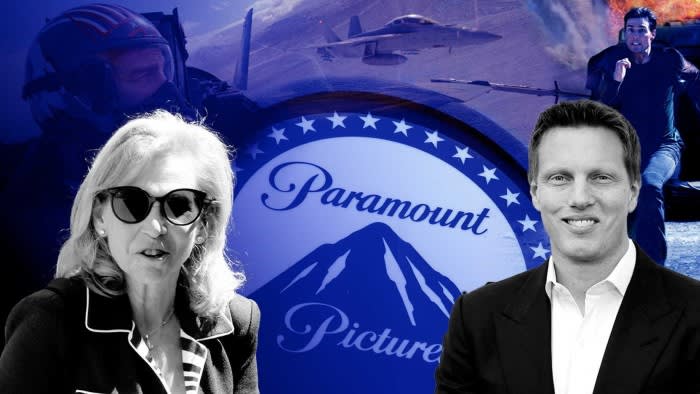After more than six months of grueling negotiations, David Ellison thought he was on the verge of closing the deal of a lifetime: the takeover of Paramount, the century-old Hollywood studio.
Ellison received a message Tuesday morning in Los Angeles from an adviser to Shari Redstone, the heiress who controls the media group behind the classics, including Godfather, Chinatown and Titanic, that all the financial details of the transaction have been ironed out. At a meeting at 2:30 p.m. (New York time) on Tuesday, Paramount’s special committee plans to greenlight the proposal from Ellison’s company, Skydance Media.
And then came the plot twist. Minutes before the independent advisers evaluating Skydance’s bid were ready to recommend it, lawyers for Redstone Ropes & Gray sent a terse email to the board’s special committee saying the deal was dead. “While it is true that we are in agreement on all the essential economic terms, there are other outstanding terms and we are essentially withdrawing,” the message said, according to a person familiar with the matter who paraphrased its contents.
“Shari effectively killed a deal that was fully agreed, fully done on all the key economic issues two minutes before the special committee meeting,” the person added. “That was it.”
It was a sudden, bittersweet ending to a story whose two characters had forged an incredible bond. Both are children of billionaire fathers: Redstone, 70, is the daughter of Sumner Redstone, who built the media and entertainment empire that underpins Paramount, a group that also includes CBS, MTV, Comedy Central and Nickelodeon. Ellison’s father, Larry, is a billionaire co-founder of Oracle, the software group.
David Ellison also has a deep connection with Paramount, having produced a number of blockbusters with the studio, including Top Gun: Maverick.
But their relationship has soured in recent weeks as they have clashed over the details of the deal – and there has been speculation that Redstone has doubts about leaving the family business. When it was all over, exasperated councilors said they couldn’t remember a more muddled process. And observers from Wall Street to Hollywood were left wondering what Redstone’s next move would be.
Paramount provided a rare opportunity for Ellison to gain control of one of Hollywood’s crown jewels, steeped in history with its iconic Melrose Avenue lot and century-old film library.
The studio struggled to adapt to the digital age, but Ellison, 41, believed he could fix the group’s growing problems. Its once-mighty, generation-defining TV channels like MTV are in long-term decline, while streaming service Paramount+ is losing money.
Paramount, valued at less than $8 billion on the stock market, has more than $14 billion in debt that was recently downgraded to junk. Investors have lost faith that the company can compete on its own, making it the subject of acquisition speculation for several years. The stock is down 30% this year, including a nearly 15% drop since the talks broke down.
The deal was never going to be easy to make. Ellison’s plan had two steps: First, his company would buy National Amusements (NAI), the Redstone-controlled group that holds 77 percent of Paramount’s voting stock. Paramount will then acquire Skydance through a stock deal.
The first cracks appeared in May when Ellison’s consortium, which included private equity groups RedBird and KKR, as well as his family’s fortune, adjusted its bid after it became clear that Paramount’s common shareholders planned to fight back. Several holders of Paramount’s non-voting stock have publicly threatened to sue if the deal goes through, saying all the value would go to Redstone, which holds most of the voting stock.
So Ellison’s team decided to pay NAI — and by extension Redstone itself — less than originally proposed to sweeten the deal for Paramount’s B shareholders.
After Skydance decided in May to drop its bid for NAI from $2.5 billion to $2.3 billion, including debt, Redstone stopped talking to Ellison, people briefed on the matter said. Others involved said the decision to suspend communication was out of respect for the negotiation process with the special committee. NAI ultimately agreed to the lower offer of $2.3 billion, these people added.
However, Redstone has begun to lose confidence in Ellison since the adjusted offer, people close to her said. The same people added that despite Redstone’s changing perception of Ellison, the Skydance founder was highly regarded by NAI and Paramount advisers for his integrity throughout the process.
It was only after Ellison was told the deal was dead that Redstone informed him she was upset about the reduced cash offer for her stake, a person close to her said. “She was unhappy that she didn’t get more,” the person said.
Other people close to Redstone disputed that, saying the deal failed because Ellison’s camp resisted calls to allow non-voting shareholders to register their “consent” — or lack thereof — to the transaction through some kind of count. “Obviously it would provide protection against shareholder litigation,” said another person familiar with Redstone’s thinking.
People close to Skydance and Paramount said Redstone decided to use the “consent” vote as a last-minute excuse to end the deal; the issue was clarified at the very beginning of the negotiations.
There were other signs of friction as Redstone pursued the sale. In April, Redstone fired longtime trusted CEO Bob Bakish, who had made no secret of his opposition to the Skydance deal, and continued talks with other potential candidates. She replaced Bakish with three Paramount executives who formed an “office of the CEO.” Four board members also left this spring.
During the process, other potential candidates came and went. Paramount’s stock plunged in December when it emerged that Bakish had met with his Warner Bros Discovery co-star David Zaslav. Private equity group Apollo approached Paramount twice, most recently with Sony as a partner. And this week, Edgar Bronfman Jr., the Seagram heir, made an approach along with Bain Capital.
Multiple people directly and indirectly involved in the process said there was more than money that convinced Redstone to back out of the Ellison deal she initiated months ago.
Several people said Redstone couldn’t part with a company that was founded by her grandfather and built into a global power by her father, with whom she had a rocky relationship.
Redstone appears to have warmed to the turnaround plans drawn up by the three members of the CEO’s office, a group that many expected to be mere back-up parts until the Skydance deal is completed. But last week they released a plan to cut costs and reorganize the group, and she gave them her blessing.
“If all Skydance is going to do is take costs out of the business and streamline the streaming business, we could just do it ourselves, without the risk of litigation and 12 to 18 months [to get to] closing,” said a person familiar with the strategy.
However, some investors seem confused by the idea. “It could be good as a gatekeeper model,” said John Rogers, chairman and co-CEO of Ariel Investments. “But I haven’t had anything where you have a long-term agreement with three leaders. It’s just not normal.”
Multiple people, including former and current board members, said another factor playing against Skydance was the role of Charles Phillips, a Paramount board member who tried to derail the deal throughout the process.
Phillips, who worked at Oracle until 2010, opposed the deal and frequently spoke out against it, former and current Paramount board members said. He did so by putting multiple obstacles in the way of the Skydance deal and by speaking negatively about Redstone’s Ellison family, the people said.
A number of people involved in the trial said Phillips should have recused himself from the trial because he is personally opposed to the Ellisons because of their history. Phillips did not immediately respond to a request for comment; a person close to the board disputed the claim, saying he “has deep respect for Ellison.”
Pushing from the other direction was another Oracle veteran: Larry Ellison himself, who became more actively involved as the negotiations drew to a close. Some in Redstone’s camp have pointed to Larry Ellison’s involvement as a reason for the rise in tension over the past week. “The more Larry gets into it, the more the relationship deteriorates,” said a person familiar with the situation. “He had an affection for David, but Larry has sharper elbows.”
Another person involved in the deal talks dismissed such concerns. “Larry was obviously involved,” he said. “Larry was writing a big check.”
Whatever the tension, David Ellison believed he would sign a deal to acquire Paramount this week. “It was all decided,” said one person involved.
Like a classic Hollywood backstage, the collapse leaves Redstone at a dead end with no obvious way out. Paramount is small, struggling and writhing under a mountain of debt, and its stock price is in freefall. Her family’s fortunes are strained by financial pressures related to her father’s death. And NAI has its own debt burden. But even after months of negotiations, people close to Ellison’s offer say they aren’t sure what motivated Redstone to pull the plug.
“Eventually, [maybe] she got to the finish line and decided she couldn’t sell her inheritance,” said one.



